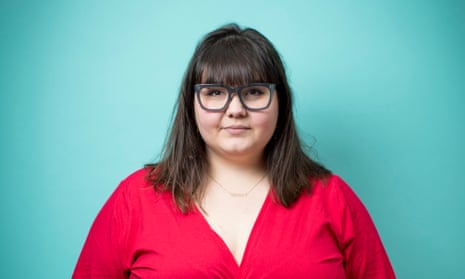It was during a late-night, mid-pandemic Zoom call with my also-fat friend that we, almost whispering, admitted to each other that we were quite enjoying lockdown. Not the deaths and the government’s mishandling of the situation, nor having just lost all our income. “Obviously not that!” we would say, repeatedly. “Of course, we don’t enjoy those things.”
So what did we enjoy? It took us a while to figure out why we felt lighter, more confident. More at peace with ourselves … and our fat bodies. Eventually, one of us said: “I haven’t been shouted at in the street for a long time.”
We began listing all the things that we had got used to over decades of living in fat bodies, which we were no longer experiencing because the world had shut down and we had to stay at home. These are things you don’t tend to notice if you live in a smaller body: how many chairs and seats have armrests, for example. But, at a certain size, armrests mean that you have to ask if there is another seat available. If not, you can’t sit down. And unless you have balls of steel and are willing to see if the audience at Les Misérables will accept you standing up in the middle of the stalls, you will probably just have to leave.
Quarantine was the only time in my adult life where I hadn’t felt the stress of “can I fit into this seat?” or the painful, pinching feeling of the armrests digging into my hips, cutting off blood supply to my legs. Suddenly, there were no plane seats, tube seats, cafe seats, waiting room seats or – yes – toilet seats. Or toilet stalls. At no point during quarantine did I go to a bathroom only to find there was a serious risk that if I sat down I would end up stuck between the two partitions, one bum cheek resting on a sanitary bin.
There was no standing on an escalator, making yourself as small as possible so as not to annoy the people who have to squeeze past. There was no sucking your stomach in as you try to get to your table in a restaurant, in case it might slap other diners across the neck.
Later in the pandemic, going to a cafe was incredible: for the first time there was space, due to social distancing. “This must be what the world feels like for thin people,” I said to my friend. “Do you think they all walk around feeling like the world is … made for them?”
Meanwhile, medical professionals from all sides were debating whether or not Covid affected fat people more than thin people and if so, why, and so on. Meanwhile, fat people were among some of the first groups to qualify for the vaccine.
It is rare, as a fat person, to feel privileged. Apart from our bodies functioning as a dickhead-detector – we can quickly identify when a person only treats others well if they are conventionally attractive – there are few upsides. Until the vaccines. Being fat often means that you get worse medical treatment – and suddenly, we were prioritised! I felt elated. I now understand why people with privilege can be so obnoxious sometimes.
Towards the end of the Zoom call with my fat friend, she said, in a quiet voice: “I’m actually not looking forward to lockdown ending. Especially now that I’m so much fatter.”
I nodded. So many of us have gained weight – a completely natural and understandable reaction to having lived through a global pandemic, quarantined at home. While it’s obviously a good thing that fewer people are getting sick and dying from Covid, there are a lot of us who miss aspects of the quarantine period.
Disabled and chronically ill people, who have always been forced to stay at home, were finally able to enjoy more live shows being streamed. When people on social media complained about cabin fever, I saw my disabled friends saying: “That’s what we’ve been trying to tell you!” through gritted teeth.
Many of us fat people experienced what it was like to not be abused in the street or feel unwelcome in public spaces. It was nice.
I don’t want things to go back to what they were like before. I want us to enter into a new reality, where we take better care of people, regardless of the bodies in which they exist. Two years without experiencing fatphobia has made me feel happier, more confident and less stressed. It would be good if it didn’t take a global pandemic to reach that state.
Sofie Hagen is a writer and comedian
